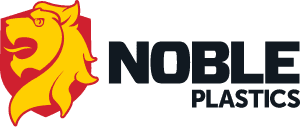We have added a new services page to our website! Now you will find our (Bold!) Mold Transfer program alongside our molding and automation offerings. If you find yourself in this position and are looking to move your mold, Noble Plastics is ready to help!
Engineers play a crucial role in injection molding processes, particularly those that use scientific molding principles and process automation tools. All aspects of injection molding, including process development and optimization, material selection, mold and part design, quality control, troubleshooting, and continuous improvements, rely on an engineering approach that prioritizes knowledge and expertise to ensure high-quality, consistent results.
At Noble Plastics, our co-founders, Missy and Scott Rogers, are both engineers. Missy, the company president, earned a mechanical engineering degree, which complements her strong organizational and leadership skills. Her husband Scott, technical director and creative visionary, earned a master’s degree in mechanical engineering and, as a product inventor, holds 18 patents. Their engineering background gives them a unique perspective and skill set that compelled them to leverage automation technology to improve their business operations and stay competitive in the market.
Think You’re Ready to Get Started? Request a quote today and discover how Noble Plastics removes the mystery from injection molding, automation, and more.
New Technology Drives Operational Excellence
When a vibrant engineering approach and technology are the driving forces behind business decisions, amazing things happen. We have become a respected leader in injection molding and robotic integration. In fact, we have been recognized throughout the industry for the advances our automation systems and our proprietary ROC40™ technology have brought to injection molding. We have been asked to speak on our accomplishments and have hosted national tours. At Noble Plastics, we live and breathe technology. We are not following what others do for technology development; we are striving to lead the industry.
We developed ROC40, a Predictive Production Solution (PPS), to leverage advanced technology to create more strategic business efficiencies. This Industry 4.0 product comprises a device and app software that we use to improve our operations. It integrates data that is often siloed from enterprise systems, automation, robotics, and molding equipment and makes it available to all personnel and intelligent systems, which may be embedded in the data generators or may exist in the cloud or other locations.
It also provides built-in dashboards showing real-time facility and station performance and notifies operators of equipment alerts. Dashboards are automatically personalized depending on a team member’s role and specific responsibilities. A messaging system enables inter-team requests to facilitate problem resolution. Quality control samples can be captured and tracked, and station metrics and progress can also be tracked.
Explore our Mold Transfer Capabilities: Exceptional mold transfer services require communication, quality control processes, documentation, and more. Learn more here.
Engineering Approach To Product Realizations
From the moment we engage with a customer, we implement a systems engineering approach, a planned and systematic approach to product realization and delivery. In addition to using design for manufacturability (DFM) principles to review parts, we characterize and capture a product’s performance requirements and demonstrate how those requirements will be achieved. We look at how we will measure the performance, at what frequency, whether it will be destructive or nondestructive, and so on.
It’s not enough to say that a product meets specifications. We document how we will prove it and then prove it. Even when companies come to us with an already established product, we implement this approach so that we will have a complete understanding of what they need to be successful, so we can be successful in providing what they need.
Every stage of our injection molding processes has been touched by technology. In addition to ROC40, we have other technologies we rely on. We use virtual modeling and mold simulation software in the development stage that looks not only at the plastic performance but also at how heat is transferred within the tooling throughout the molding cycle.
Of course, custom automation and robotics are a big part of our operation, allowing us to work 24/7 and, in some circumstances, run in a lights-out fashion where an operator is not required for input for at least 8 hours. Our proactive planning is designed to minimize scrap, employing technology such as the ability to monitor in-mold sensors as well as equipment conditions to alert of issues within the molding process. All these technologies collectively allow us to efficiently create high-quality parts consistently and meet our customer’s delivery requirements.
Connect with us to learn how our engineering approach can help your next injection-molded application succeed.
MORE N-SIGHTS™
10 Years of Mystery Design at UL
March 30, 2023 marked the ten year anniversary of the UL Mystery Design Challenge hosted by Noble Plastics! During the University of Louisiana at Lafayette’s Engineering Week, Noble Plastics sponsors a design challenge that all engineering disciplines compete in.
A Scientific Approach to Product Onboarding
Noble Plastics takes a scientific approach to new product onboarding to remove uncertainty and ensure consistent quality. Learn more.
Join Our Conversation
SUBCRIBE TO NOBLE INSIGHTS
